Business Ethics, Responsibility and Sustainability in Food Industry
VerifiedAdded on 2023/06/15
|11
|3713
|129
AI Summary
This article discusses the challenges related to CSR and sustainability in the food industry. It also analyses the best practices within the sector, making references to ethical and moral issues. Recommendations are made for businesses in the sector to show they are being more responsible by taking into account global considerations.
Contribute Materials
Your contribution can guide someone’s learning journey. Share your
documents today.
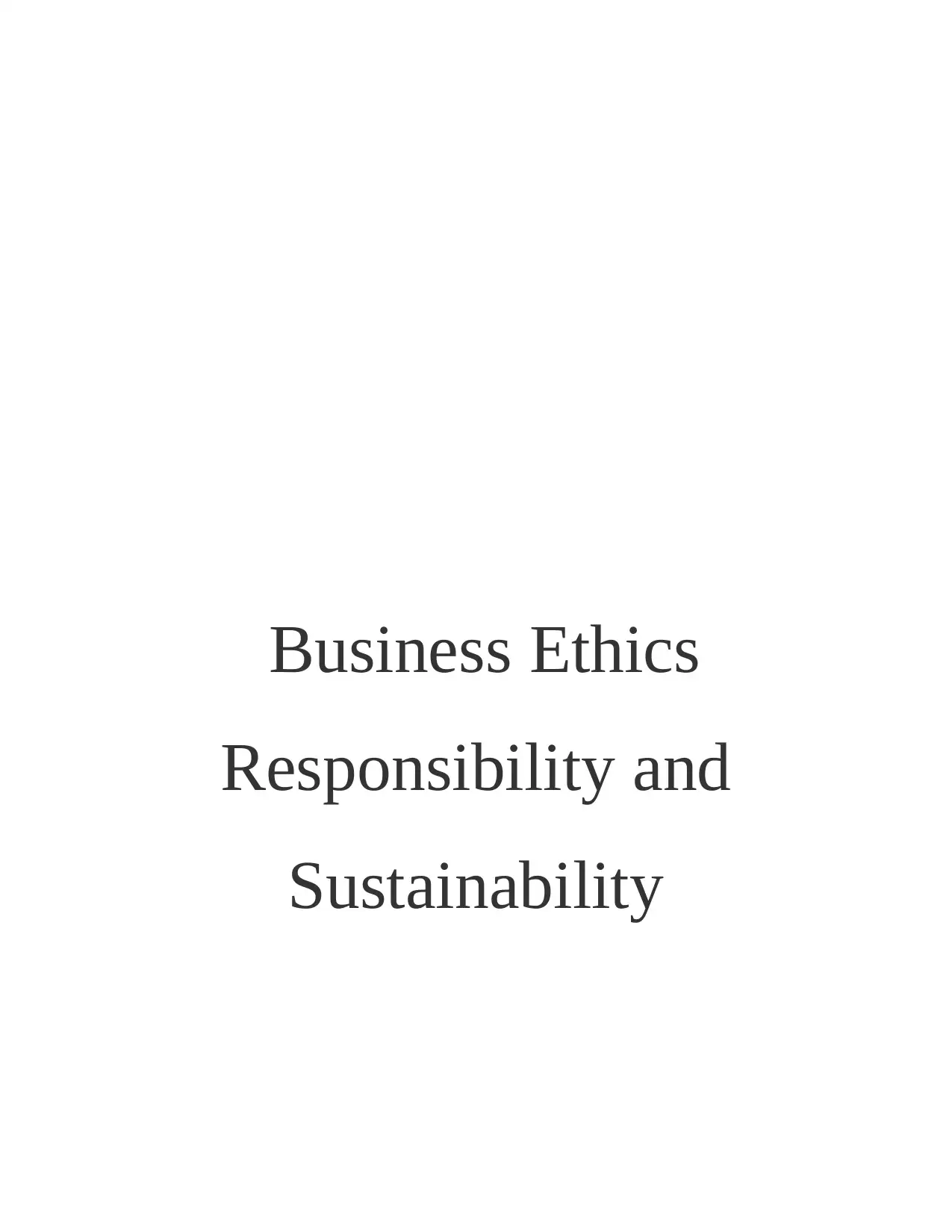
Business Ethics
Responsibility and
Sustainability
Responsibility and
Sustainability
Secure Best Marks with AI Grader
Need help grading? Try our AI Grader for instant feedback on your assignments.
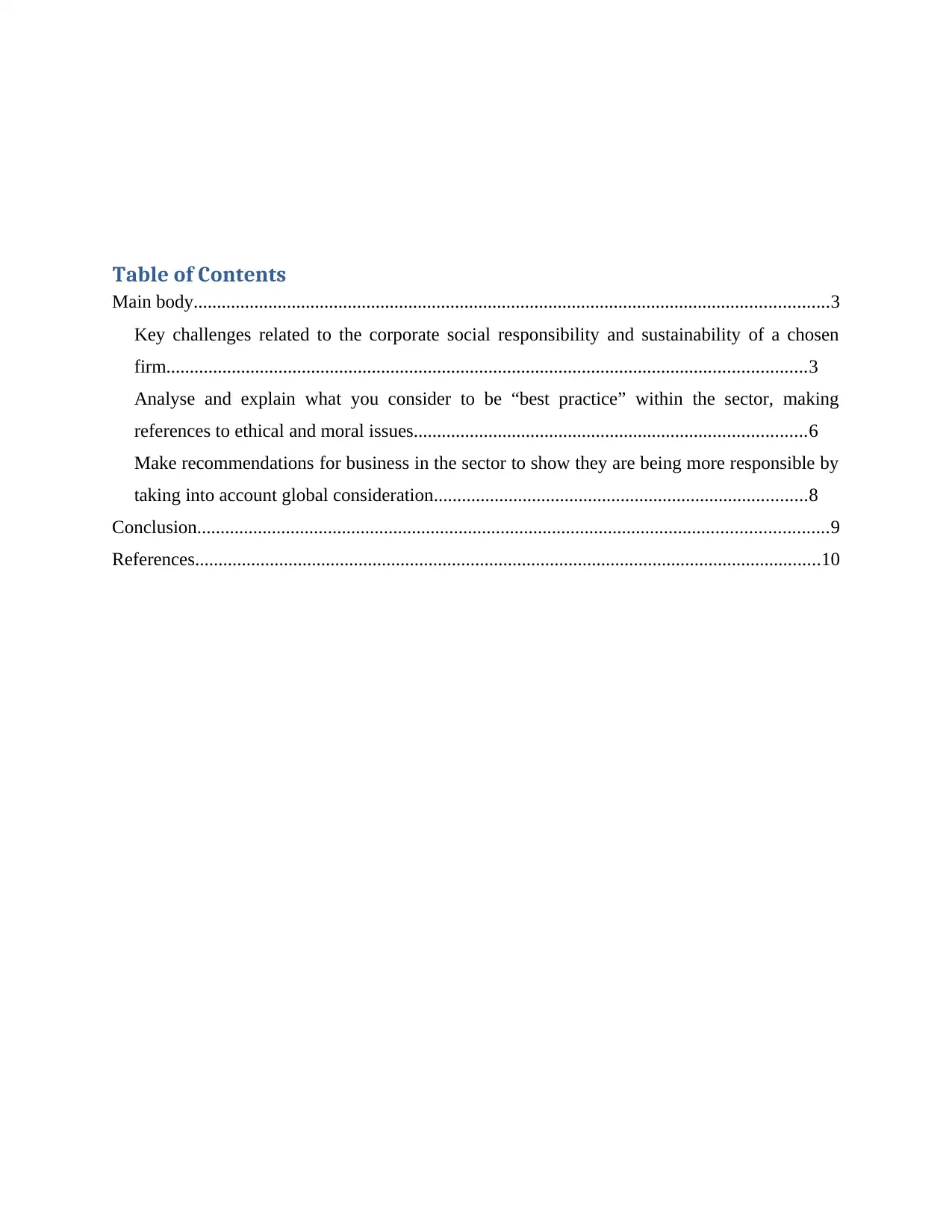
Table of Contents
Main body........................................................................................................................................3
Key challenges related to the corporate social responsibility and sustainability of a chosen
firm.........................................................................................................................................3
Analyse and explain what you consider to be “best practice” within the sector, making
references to ethical and moral issues....................................................................................6
Make recommendations for business in the sector to show they are being more responsible by
taking into account global consideration................................................................................8
Conclusion.......................................................................................................................................9
References......................................................................................................................................10
Main body........................................................................................................................................3
Key challenges related to the corporate social responsibility and sustainability of a chosen
firm.........................................................................................................................................3
Analyse and explain what you consider to be “best practice” within the sector, making
references to ethical and moral issues....................................................................................6
Make recommendations for business in the sector to show they are being more responsible by
taking into account global consideration................................................................................8
Conclusion.......................................................................................................................................9
References......................................................................................................................................10
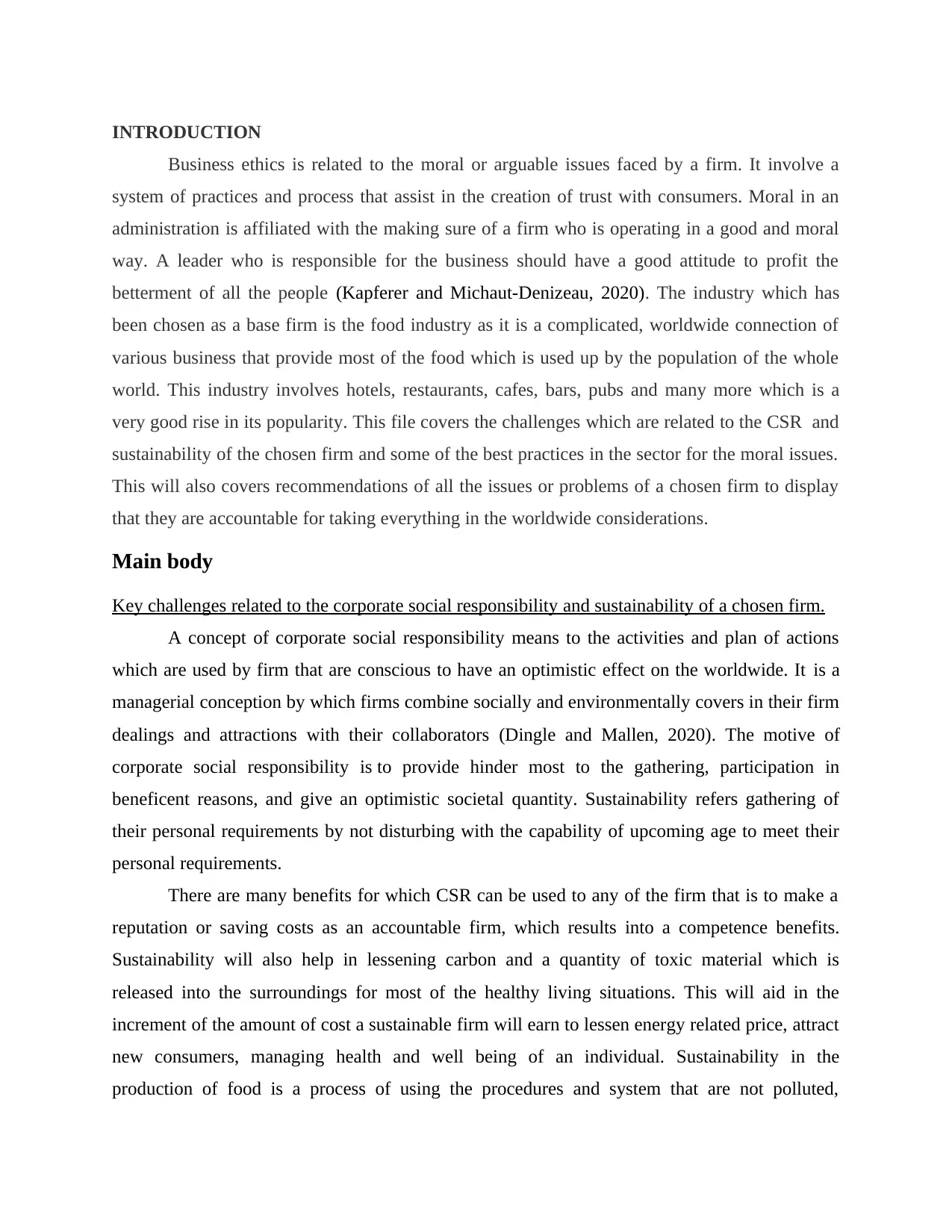
INTRODUCTION
Business ethics is related to the moral or arguable issues faced by a firm. It involve a
system of practices and process that assist in the creation of trust with consumers. Moral in an
administration is affiliated with the making sure of a firm who is operating in a good and moral
way. A leader who is responsible for the business should have a good attitude to profit the
betterment of all the people (Kapferer and Michaut-Denizeau, 2020). The industry which has
been chosen as a base firm is the food industry as it is a complicated, worldwide connection of
various business that provide most of the food which is used up by the population of the whole
world. This industry involves hotels, restaurants, cafes, bars, pubs and many more which is a
very good rise in its popularity. This file covers the challenges which are related to the CSR and
sustainability of the chosen firm and some of the best practices in the sector for the moral issues.
This will also covers recommendations of all the issues or problems of a chosen firm to display
that they are accountable for taking everything in the worldwide considerations.
Main body
Key challenges related to the corporate social responsibility and sustainability of a chosen firm.
A concept of corporate social responsibility means to the activities and plan of actions
which are used by firm that are conscious to have an optimistic effect on the worldwide. It is a
managerial conception by which firms combine socially and environmentally covers in their firm
dealings and attractions with their collaborators (Dingle and Mallen, 2020). The motive of
corporate social responsibility is to provide hinder most to the gathering, participation in
beneficent reasons, and give an optimistic societal quantity. Sustainability refers gathering of
their personal requirements by not disturbing with the capability of upcoming age to meet their
personal requirements.
There are many benefits for which CSR can be used to any of the firm that is to make a
reputation or saving costs as an accountable firm, which results into a competence benefits.
Sustainability will also help in lessening carbon and a quantity of toxic material which is
released into the surroundings for most of the healthy living situations. This will aid in the
increment of the amount of cost a sustainable firm will earn to lessen energy related price, attract
new consumers, managing health and well being of an individual. Sustainability in the
production of food is a process of using the procedures and system that are not polluted,
Business ethics is related to the moral or arguable issues faced by a firm. It involve a
system of practices and process that assist in the creation of trust with consumers. Moral in an
administration is affiliated with the making sure of a firm who is operating in a good and moral
way. A leader who is responsible for the business should have a good attitude to profit the
betterment of all the people (Kapferer and Michaut-Denizeau, 2020). The industry which has
been chosen as a base firm is the food industry as it is a complicated, worldwide connection of
various business that provide most of the food which is used up by the population of the whole
world. This industry involves hotels, restaurants, cafes, bars, pubs and many more which is a
very good rise in its popularity. This file covers the challenges which are related to the CSR and
sustainability of the chosen firm and some of the best practices in the sector for the moral issues.
This will also covers recommendations of all the issues or problems of a chosen firm to display
that they are accountable for taking everything in the worldwide considerations.
Main body
Key challenges related to the corporate social responsibility and sustainability of a chosen firm.
A concept of corporate social responsibility means to the activities and plan of actions
which are used by firm that are conscious to have an optimistic effect on the worldwide. It is a
managerial conception by which firms combine socially and environmentally covers in their firm
dealings and attractions with their collaborators (Dingle and Mallen, 2020). The motive of
corporate social responsibility is to provide hinder most to the gathering, participation in
beneficent reasons, and give an optimistic societal quantity. Sustainability refers gathering of
their personal requirements by not disturbing with the capability of upcoming age to meet their
personal requirements.
There are many benefits for which CSR can be used to any of the firm that is to make a
reputation or saving costs as an accountable firm, which results into a competence benefits.
Sustainability will also help in lessening carbon and a quantity of toxic material which is
released into the surroundings for most of the healthy living situations. This will aid in the
increment of the amount of cost a sustainable firm will earn to lessen energy related price, attract
new consumers, managing health and well being of an individual. Sustainability in the
production of food is a process of using the procedures and system that are not polluted,
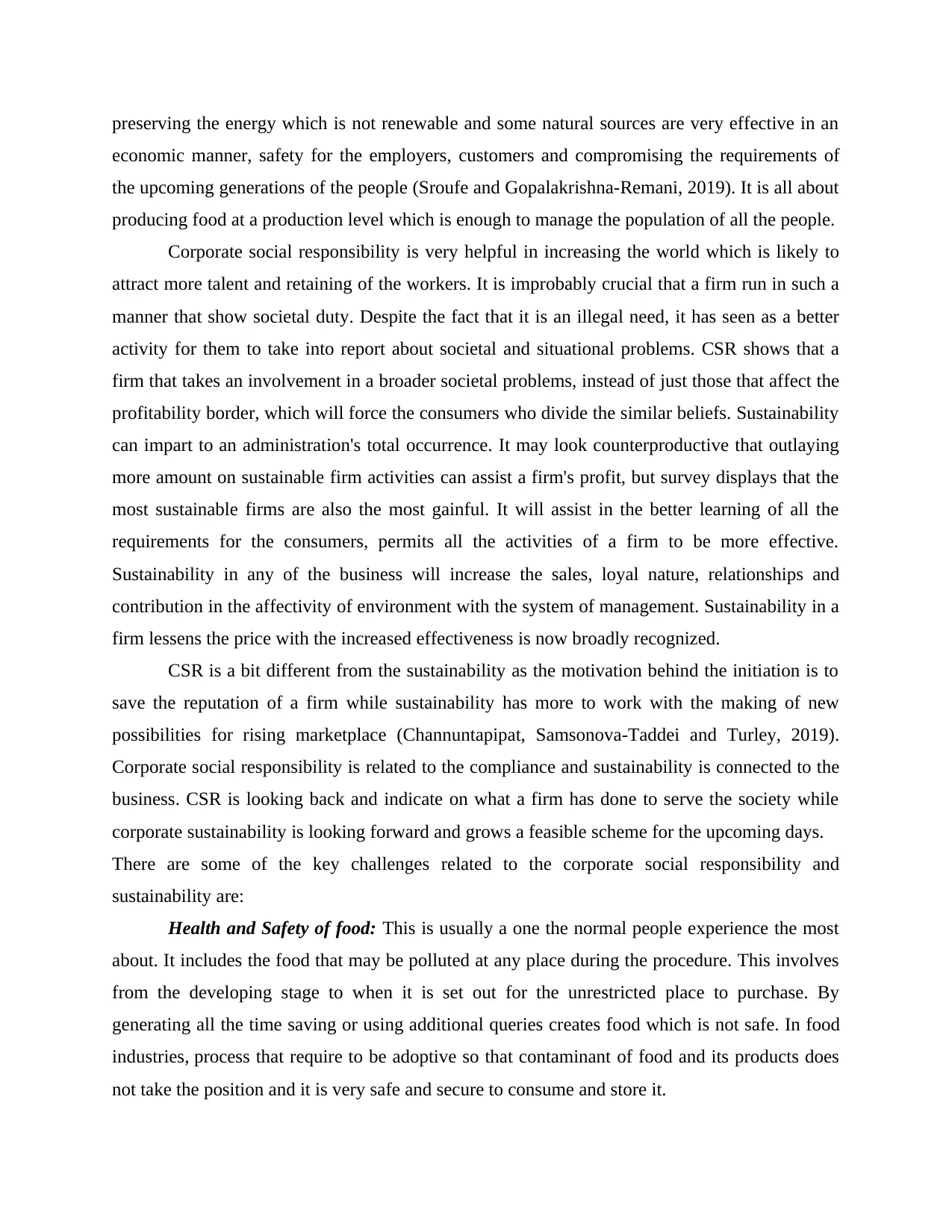
preserving the energy which is not renewable and some natural sources are very effective in an
economic manner, safety for the employers, customers and compromising the requirements of
the upcoming generations of the people (Sroufe and Gopalakrishna-Remani, 2019). It is all about
producing food at a production level which is enough to manage the population of all the people.
Corporate social responsibility is very helpful in increasing the world which is likely to
attract more talent and retaining of the workers. It is improbably crucial that a firm run in such a
manner that show societal duty. Despite the fact that it is an illegal need, it has seen as a better
activity for them to take into report about societal and situational problems. CSR shows that a
firm that takes an involvement in a broader societal problems, instead of just those that affect the
profitability border, which will force the consumers who divide the similar beliefs. Sustainability
can impart to an administration's total occurrence. It may look counterproductive that outlaying
more amount on sustainable firm activities can assist a firm's profit, but survey displays that the
most sustainable firms are also the most gainful. It will assist in the better learning of all the
requirements for the consumers, permits all the activities of a firm to be more effective.
Sustainability in any of the business will increase the sales, loyal nature, relationships and
contribution in the affectivity of environment with the system of management. Sustainability in a
firm lessens the price with the increased effectiveness is now broadly recognized.
CSR is a bit different from the sustainability as the motivation behind the initiation is to
save the reputation of a firm while sustainability has more to work with the making of new
possibilities for rising marketplace (Channuntapipat, Samsonova-Taddei and Turley, 2019).
Corporate social responsibility is related to the compliance and sustainability is connected to the
business. CSR is looking back and indicate on what a firm has done to serve the society while
corporate sustainability is looking forward and grows a feasible scheme for the upcoming days.
There are some of the key challenges related to the corporate social responsibility and
sustainability are:
Health and Safety of food: This is usually a one the normal people experience the most
about. It includes the food that may be polluted at any place during the procedure. This involves
from the developing stage to when it is set out for the unrestricted place to purchase. By
generating all the time saving or using additional queries creates food which is not safe. In food
industries, process that require to be adoptive so that contaminant of food and its products does
not take the position and it is very safe and secure to consume and store it.
economic manner, safety for the employers, customers and compromising the requirements of
the upcoming generations of the people (Sroufe and Gopalakrishna-Remani, 2019). It is all about
producing food at a production level which is enough to manage the population of all the people.
Corporate social responsibility is very helpful in increasing the world which is likely to
attract more talent and retaining of the workers. It is improbably crucial that a firm run in such a
manner that show societal duty. Despite the fact that it is an illegal need, it has seen as a better
activity for them to take into report about societal and situational problems. CSR shows that a
firm that takes an involvement in a broader societal problems, instead of just those that affect the
profitability border, which will force the consumers who divide the similar beliefs. Sustainability
can impart to an administration's total occurrence. It may look counterproductive that outlaying
more amount on sustainable firm activities can assist a firm's profit, but survey displays that the
most sustainable firms are also the most gainful. It will assist in the better learning of all the
requirements for the consumers, permits all the activities of a firm to be more effective.
Sustainability in any of the business will increase the sales, loyal nature, relationships and
contribution in the affectivity of environment with the system of management. Sustainability in a
firm lessens the price with the increased effectiveness is now broadly recognized.
CSR is a bit different from the sustainability as the motivation behind the initiation is to
save the reputation of a firm while sustainability has more to work with the making of new
possibilities for rising marketplace (Channuntapipat, Samsonova-Taddei and Turley, 2019).
Corporate social responsibility is related to the compliance and sustainability is connected to the
business. CSR is looking back and indicate on what a firm has done to serve the society while
corporate sustainability is looking forward and grows a feasible scheme for the upcoming days.
There are some of the key challenges related to the corporate social responsibility and
sustainability are:
Health and Safety of food: This is usually a one the normal people experience the most
about. It includes the food that may be polluted at any place during the procedure. This involves
from the developing stage to when it is set out for the unrestricted place to purchase. By
generating all the time saving or using additional queries creates food which is not safe. In food
industries, process that require to be adoptive so that contaminant of food and its products does
not take the position and it is very safe and secure to consume and store it.
Secure Best Marks with AI Grader
Need help grading? Try our AI Grader for instant feedback on your assignments.
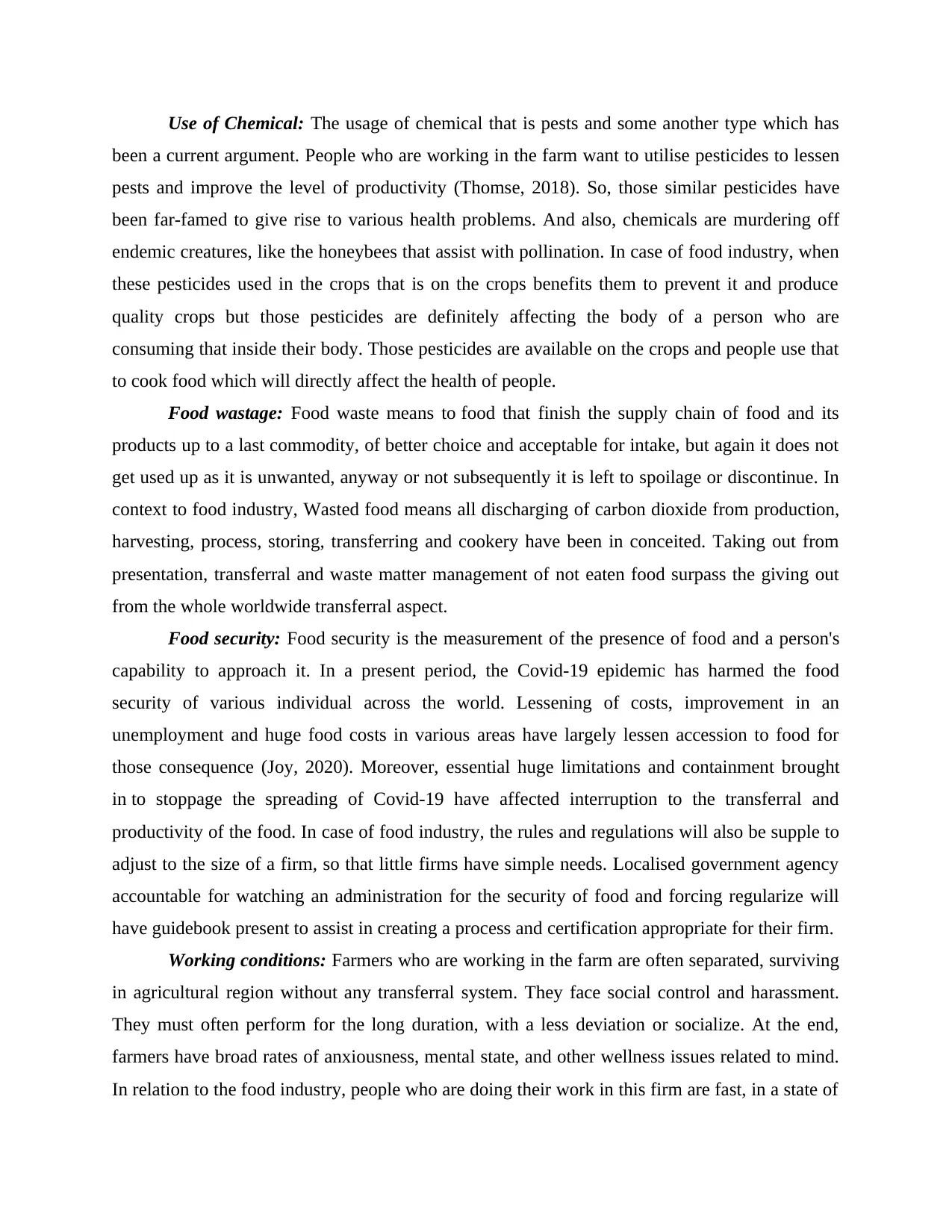
Use of Chemical: The usage of chemical that is pests and some another type which has
been a current argument. People who are working in the farm want to utilise pesticides to lessen
pests and improve the level of productivity (Thomse, 2018). So, those similar pesticides have
been far-famed to give rise to various health problems. And also, chemicals are murdering off
endemic creatures, like the honeybees that assist with pollination. In case of food industry, when
these pesticides used in the crops that is on the crops benefits them to prevent it and produce
quality crops but those pesticides are definitely affecting the body of a person who are
consuming that inside their body. Those pesticides are available on the crops and people use that
to cook food which will directly affect the health of people.
Food wastage: Food waste means to food that finish the supply chain of food and its
products up to a last commodity, of better choice and acceptable for intake, but again it does not
get used up as it is unwanted, anyway or not subsequently it is left to spoilage or discontinue. In
context to food industry, Wasted food means all discharging of carbon dioxide from production,
harvesting, process, storing, transferring and cookery have been in conceited. Taking out from
presentation, transferral and waste matter management of not eaten food surpass the giving out
from the whole worldwide transferral aspect.
Food security: Food security is the measurement of the presence of food and a person's
capability to approach it. In a present period, the Covid-19 epidemic has harmed the food
security of various individual across the world. Lessening of costs, improvement in an
unemployment and huge food costs in various areas have largely lessen accession to food for
those consequence (Joy, 2020). Moreover, essential huge limitations and containment brought
in to stoppage the spreading of Covid-19 have affected interruption to the transferral and
productivity of the food. In case of food industry, the rules and regulations will also be supple to
adjust to the size of a firm, so that little firms have simple needs. Localised government agency
accountable for watching an administration for the security of food and forcing regularize will
have guidebook present to assist in creating a process and certification appropriate for their firm.
Working conditions: Farmers who are working in the farm are often separated, surviving
in agricultural region without any transferral system. They face social control and harassment.
They must often perform for the long duration, with a less deviation or socialize. At the end,
farmers have broad rates of anxiousness, mental state, and other wellness issues related to mind.
In relation to the food industry, people who are doing their work in this firm are fast, in a state of
been a current argument. People who are working in the farm want to utilise pesticides to lessen
pests and improve the level of productivity (Thomse, 2018). So, those similar pesticides have
been far-famed to give rise to various health problems. And also, chemicals are murdering off
endemic creatures, like the honeybees that assist with pollination. In case of food industry, when
these pesticides used in the crops that is on the crops benefits them to prevent it and produce
quality crops but those pesticides are definitely affecting the body of a person who are
consuming that inside their body. Those pesticides are available on the crops and people use that
to cook food which will directly affect the health of people.
Food wastage: Food waste means to food that finish the supply chain of food and its
products up to a last commodity, of better choice and acceptable for intake, but again it does not
get used up as it is unwanted, anyway or not subsequently it is left to spoilage or discontinue. In
context to food industry, Wasted food means all discharging of carbon dioxide from production,
harvesting, process, storing, transferring and cookery have been in conceited. Taking out from
presentation, transferral and waste matter management of not eaten food surpass the giving out
from the whole worldwide transferral aspect.
Food security: Food security is the measurement of the presence of food and a person's
capability to approach it. In a present period, the Covid-19 epidemic has harmed the food
security of various individual across the world. Lessening of costs, improvement in an
unemployment and huge food costs in various areas have largely lessen accession to food for
those consequence (Joy, 2020). Moreover, essential huge limitations and containment brought
in to stoppage the spreading of Covid-19 have affected interruption to the transferral and
productivity of the food. In case of food industry, the rules and regulations will also be supple to
adjust to the size of a firm, so that little firms have simple needs. Localised government agency
accountable for watching an administration for the security of food and forcing regularize will
have guidebook present to assist in creating a process and certification appropriate for their firm.
Working conditions: Farmers who are working in the farm are often separated, surviving
in agricultural region without any transferral system. They face social control and harassment.
They must often perform for the long duration, with a less deviation or socialize. At the end,
farmers have broad rates of anxiousness, mental state, and other wellness issues related to mind.
In relation to the food industry, people who are doing their work in this firm are fast, in a state of
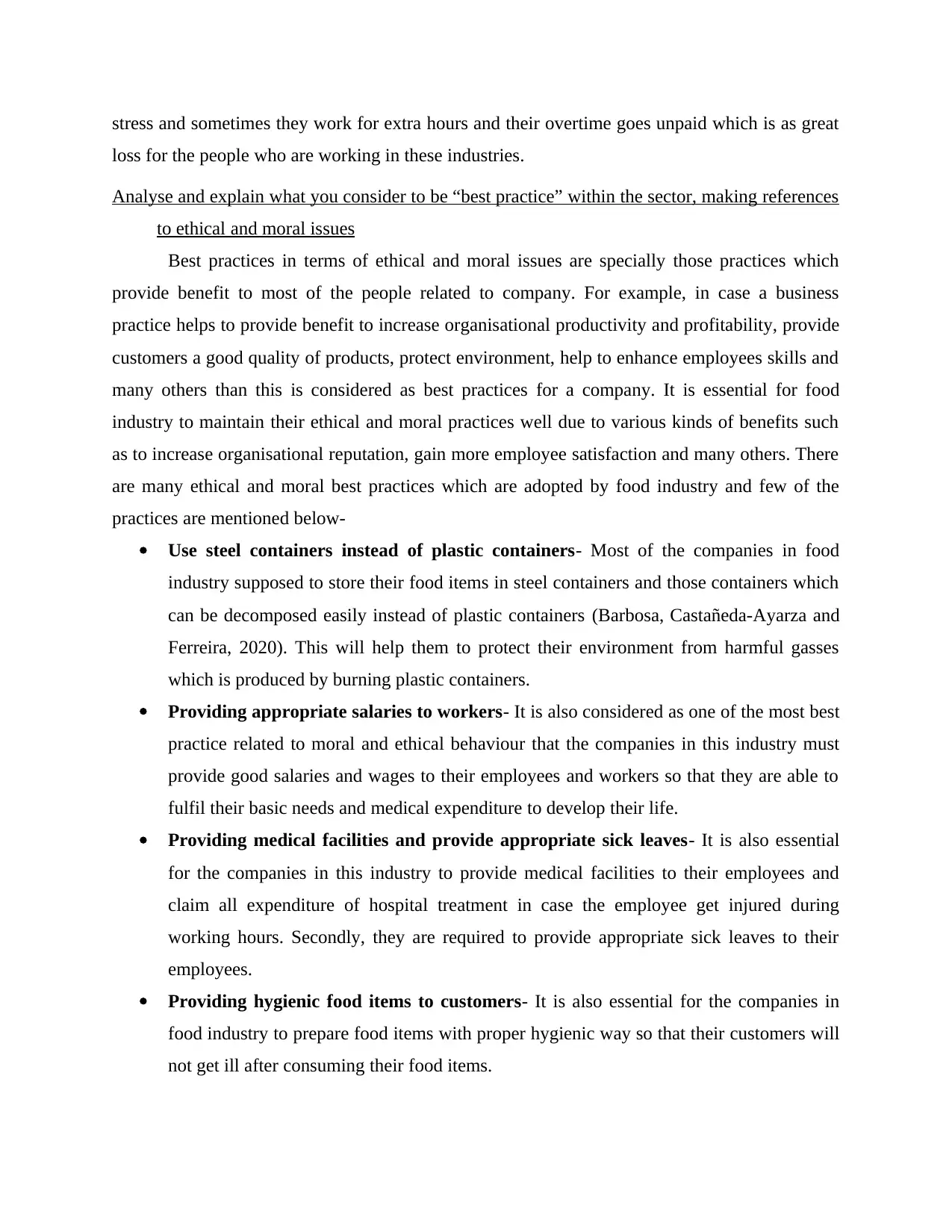
stress and sometimes they work for extra hours and their overtime goes unpaid which is as great
loss for the people who are working in these industries.
Analyse and explain what you consider to be “best practice” within the sector, making references
to ethical and moral issues
Best practices in terms of ethical and moral issues are specially those practices which
provide benefit to most of the people related to company. For example, in case a business
practice helps to provide benefit to increase organisational productivity and profitability, provide
customers a good quality of products, protect environment, help to enhance employees skills and
many others than this is considered as best practices for a company. It is essential for food
industry to maintain their ethical and moral practices well due to various kinds of benefits such
as to increase organisational reputation, gain more employee satisfaction and many others. There
are many ethical and moral best practices which are adopted by food industry and few of the
practices are mentioned below-
Use steel containers instead of plastic containers- Most of the companies in food
industry supposed to store their food items in steel containers and those containers which
can be decomposed easily instead of plastic containers (Barbosa, Castañeda-Ayarza and
Ferreira, 2020). This will help them to protect their environment from harmful gasses
which is produced by burning plastic containers.
Providing appropriate salaries to workers- It is also considered as one of the most best
practice related to moral and ethical behaviour that the companies in this industry must
provide good salaries and wages to their employees and workers so that they are able to
fulfil their basic needs and medical expenditure to develop their life.
Providing medical facilities and provide appropriate sick leaves- It is also essential
for the companies in this industry to provide medical facilities to their employees and
claim all expenditure of hospital treatment in case the employee get injured during
working hours. Secondly, they are required to provide appropriate sick leaves to their
employees.
Providing hygienic food items to customers- It is also essential for the companies in
food industry to prepare food items with proper hygienic way so that their customers will
not get ill after consuming their food items.
loss for the people who are working in these industries.
Analyse and explain what you consider to be “best practice” within the sector, making references
to ethical and moral issues
Best practices in terms of ethical and moral issues are specially those practices which
provide benefit to most of the people related to company. For example, in case a business
practice helps to provide benefit to increase organisational productivity and profitability, provide
customers a good quality of products, protect environment, help to enhance employees skills and
many others than this is considered as best practices for a company. It is essential for food
industry to maintain their ethical and moral practices well due to various kinds of benefits such
as to increase organisational reputation, gain more employee satisfaction and many others. There
are many ethical and moral best practices which are adopted by food industry and few of the
practices are mentioned below-
Use steel containers instead of plastic containers- Most of the companies in food
industry supposed to store their food items in steel containers and those containers which
can be decomposed easily instead of plastic containers (Barbosa, Castañeda-Ayarza and
Ferreira, 2020). This will help them to protect their environment from harmful gasses
which is produced by burning plastic containers.
Providing appropriate salaries to workers- It is also considered as one of the most best
practice related to moral and ethical behaviour that the companies in this industry must
provide good salaries and wages to their employees and workers so that they are able to
fulfil their basic needs and medical expenditure to develop their life.
Providing medical facilities and provide appropriate sick leaves- It is also essential
for the companies in this industry to provide medical facilities to their employees and
claim all expenditure of hospital treatment in case the employee get injured during
working hours. Secondly, they are required to provide appropriate sick leaves to their
employees.
Providing hygienic food items to customers- It is also essential for the companies in
food industry to prepare food items with proper hygienic way so that their customers will
not get ill after consuming their food items.
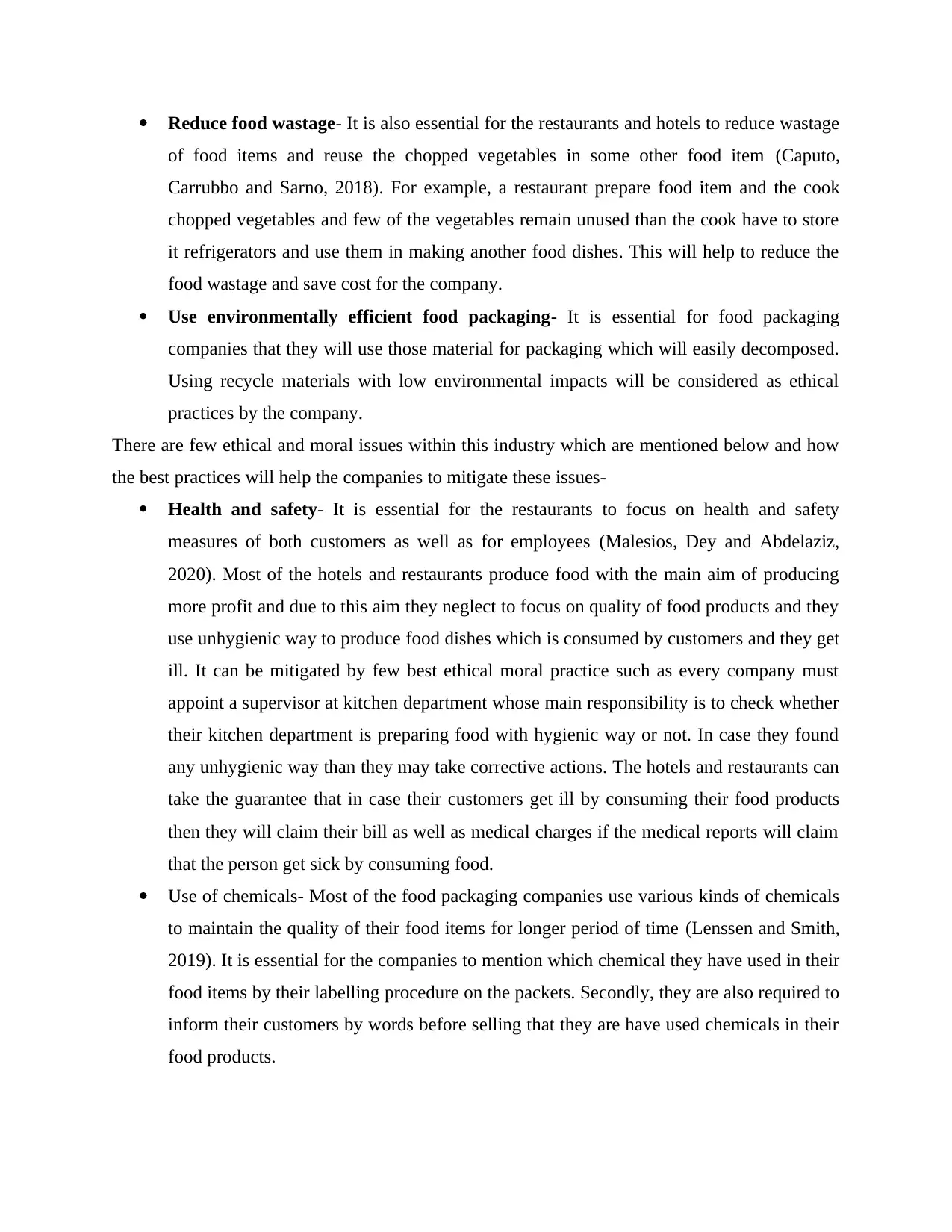
Reduce food wastage- It is also essential for the restaurants and hotels to reduce wastage
of food items and reuse the chopped vegetables in some other food item (Caputo,
Carrubbo and Sarno, 2018). For example, a restaurant prepare food item and the cook
chopped vegetables and few of the vegetables remain unused than the cook have to store
it refrigerators and use them in making another food dishes. This will help to reduce the
food wastage and save cost for the company.
Use environmentally efficient food packaging- It is essential for food packaging
companies that they will use those material for packaging which will easily decomposed.
Using recycle materials with low environmental impacts will be considered as ethical
practices by the company.
There are few ethical and moral issues within this industry which are mentioned below and how
the best practices will help the companies to mitigate these issues-
Health and safety- It is essential for the restaurants to focus on health and safety
measures of both customers as well as for employees (Malesios, Dey and Abdelaziz,
2020). Most of the hotels and restaurants produce food with the main aim of producing
more profit and due to this aim they neglect to focus on quality of food products and they
use unhygienic way to produce food dishes which is consumed by customers and they get
ill. It can be mitigated by few best ethical moral practice such as every company must
appoint a supervisor at kitchen department whose main responsibility is to check whether
their kitchen department is preparing food with hygienic way or not. In case they found
any unhygienic way than they may take corrective actions. The hotels and restaurants can
take the guarantee that in case their customers get ill by consuming their food products
then they will claim their bill as well as medical charges if the medical reports will claim
that the person get sick by consuming food.
Use of chemicals- Most of the food packaging companies use various kinds of chemicals
to maintain the quality of their food items for longer period of time (Lenssen and Smith,
2019). It is essential for the companies to mention which chemical they have used in their
food items by their labelling procedure on the packets. Secondly, they are also required to
inform their customers by words before selling that they are have used chemicals in their
food products.
of food items and reuse the chopped vegetables in some other food item (Caputo,
Carrubbo and Sarno, 2018). For example, a restaurant prepare food item and the cook
chopped vegetables and few of the vegetables remain unused than the cook have to store
it refrigerators and use them in making another food dishes. This will help to reduce the
food wastage and save cost for the company.
Use environmentally efficient food packaging- It is essential for food packaging
companies that they will use those material for packaging which will easily decomposed.
Using recycle materials with low environmental impacts will be considered as ethical
practices by the company.
There are few ethical and moral issues within this industry which are mentioned below and how
the best practices will help the companies to mitigate these issues-
Health and safety- It is essential for the restaurants to focus on health and safety
measures of both customers as well as for employees (Malesios, Dey and Abdelaziz,
2020). Most of the hotels and restaurants produce food with the main aim of producing
more profit and due to this aim they neglect to focus on quality of food products and they
use unhygienic way to produce food dishes which is consumed by customers and they get
ill. It can be mitigated by few best ethical moral practice such as every company must
appoint a supervisor at kitchen department whose main responsibility is to check whether
their kitchen department is preparing food with hygienic way or not. In case they found
any unhygienic way than they may take corrective actions. The hotels and restaurants can
take the guarantee that in case their customers get ill by consuming their food products
then they will claim their bill as well as medical charges if the medical reports will claim
that the person get sick by consuming food.
Use of chemicals- Most of the food packaging companies use various kinds of chemicals
to maintain the quality of their food items for longer period of time (Lenssen and Smith,
2019). It is essential for the companies to mention which chemical they have used in their
food items by their labelling procedure on the packets. Secondly, they are also required to
inform their customers by words before selling that they are have used chemicals in their
food products.
Paraphrase This Document
Need a fresh take? Get an instant paraphrase of this document with our AI Paraphraser
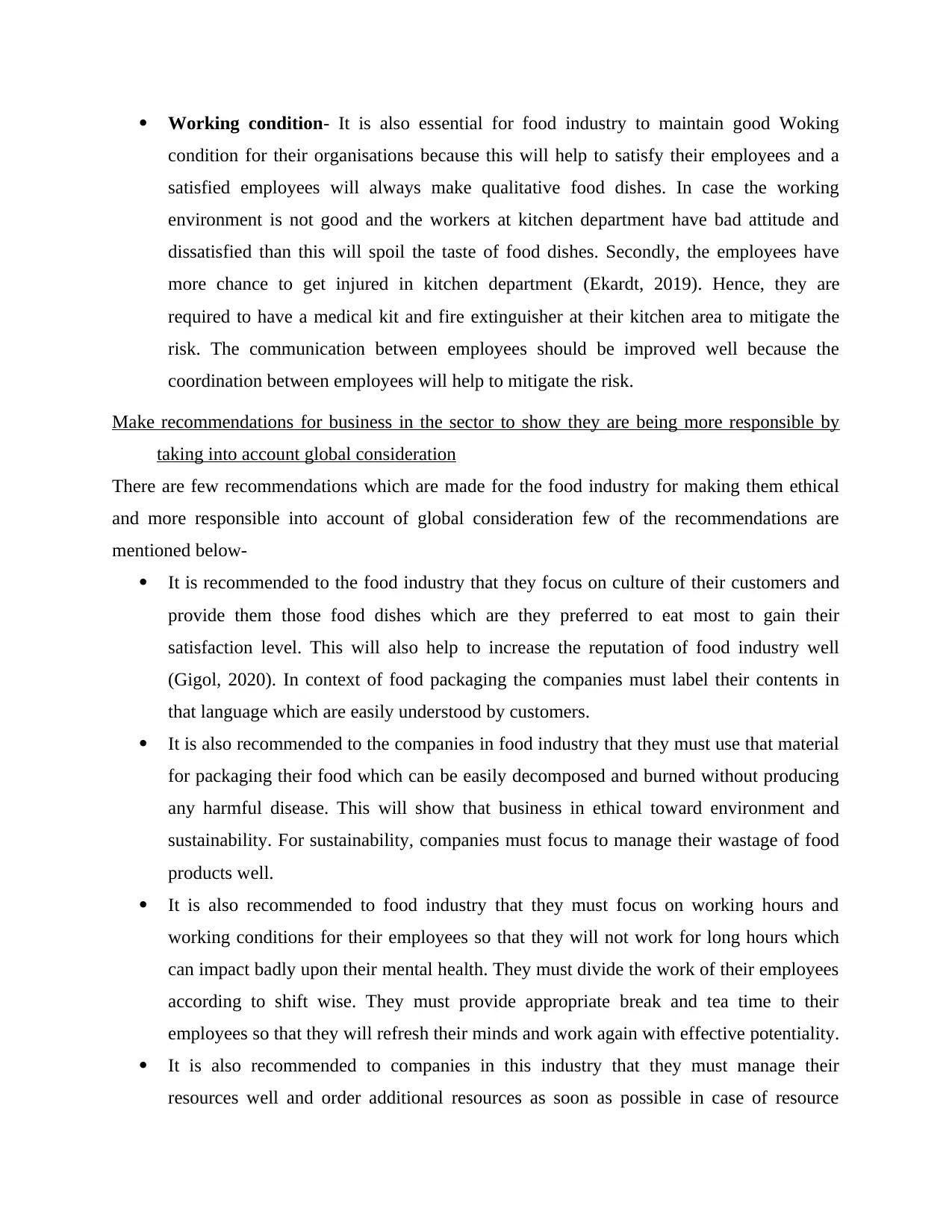
Working condition- It is also essential for food industry to maintain good Woking
condition for their organisations because this will help to satisfy their employees and a
satisfied employees will always make qualitative food dishes. In case the working
environment is not good and the workers at kitchen department have bad attitude and
dissatisfied than this will spoil the taste of food dishes. Secondly, the employees have
more chance to get injured in kitchen department (Ekardt, 2019). Hence, they are
required to have a medical kit and fire extinguisher at their kitchen area to mitigate the
risk. The communication between employees should be improved well because the
coordination between employees will help to mitigate the risk.
Make recommendations for business in the sector to show they are being more responsible by
taking into account global consideration
There are few recommendations which are made for the food industry for making them ethical
and more responsible into account of global consideration few of the recommendations are
mentioned below-
It is recommended to the food industry that they focus on culture of their customers and
provide them those food dishes which are they preferred to eat most to gain their
satisfaction level. This will also help to increase the reputation of food industry well
(Gigol, 2020). In context of food packaging the companies must label their contents in
that language which are easily understood by customers.
It is also recommended to the companies in food industry that they must use that material
for packaging their food which can be easily decomposed and burned without producing
any harmful disease. This will show that business in ethical toward environment and
sustainability. For sustainability, companies must focus to manage their wastage of food
products well.
It is also recommended to food industry that they must focus on working hours and
working conditions for their employees so that they will not work for long hours which
can impact badly upon their mental health. They must divide the work of their employees
according to shift wise. They must provide appropriate break and tea time to their
employees so that they will refresh their minds and work again with effective potentiality.
It is also recommended to companies in this industry that they must manage their
resources well and order additional resources as soon as possible in case of resource
condition for their organisations because this will help to satisfy their employees and a
satisfied employees will always make qualitative food dishes. In case the working
environment is not good and the workers at kitchen department have bad attitude and
dissatisfied than this will spoil the taste of food dishes. Secondly, the employees have
more chance to get injured in kitchen department (Ekardt, 2019). Hence, they are
required to have a medical kit and fire extinguisher at their kitchen area to mitigate the
risk. The communication between employees should be improved well because the
coordination between employees will help to mitigate the risk.
Make recommendations for business in the sector to show they are being more responsible by
taking into account global consideration
There are few recommendations which are made for the food industry for making them ethical
and more responsible into account of global consideration few of the recommendations are
mentioned below-
It is recommended to the food industry that they focus on culture of their customers and
provide them those food dishes which are they preferred to eat most to gain their
satisfaction level. This will also help to increase the reputation of food industry well
(Gigol, 2020). In context of food packaging the companies must label their contents in
that language which are easily understood by customers.
It is also recommended to the companies in food industry that they must use that material
for packaging their food which can be easily decomposed and burned without producing
any harmful disease. This will show that business in ethical toward environment and
sustainability. For sustainability, companies must focus to manage their wastage of food
products well.
It is also recommended to food industry that they must focus on working hours and
working conditions for their employees so that they will not work for long hours which
can impact badly upon their mental health. They must divide the work of their employees
according to shift wise. They must provide appropriate break and tea time to their
employees so that they will refresh their minds and work again with effective potentiality.
It is also recommended to companies in this industry that they must manage their
resources well and order additional resources as soon as possible in case of resource
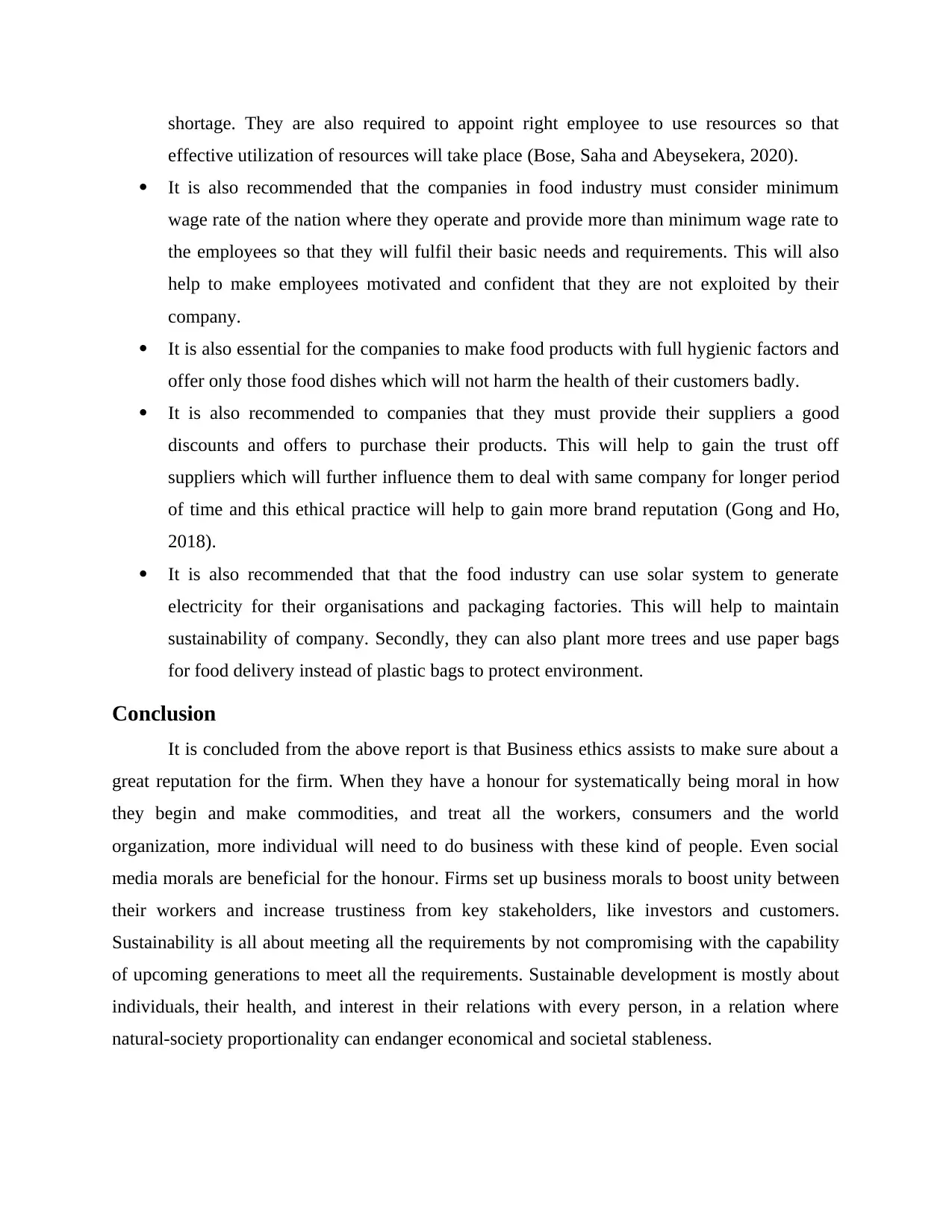
shortage. They are also required to appoint right employee to use resources so that
effective utilization of resources will take place (Bose, Saha and Abeysekera, 2020).
It is also recommended that the companies in food industry must consider minimum
wage rate of the nation where they operate and provide more than minimum wage rate to
the employees so that they will fulfil their basic needs and requirements. This will also
help to make employees motivated and confident that they are not exploited by their
company.
It is also essential for the companies to make food products with full hygienic factors and
offer only those food dishes which will not harm the health of their customers badly.
It is also recommended to companies that they must provide their suppliers a good
discounts and offers to purchase their products. This will help to gain the trust off
suppliers which will further influence them to deal with same company for longer period
of time and this ethical practice will help to gain more brand reputation (Gong and Ho,
2018).
It is also recommended that that the food industry can use solar system to generate
electricity for their organisations and packaging factories. This will help to maintain
sustainability of company. Secondly, they can also plant more trees and use paper bags
for food delivery instead of plastic bags to protect environment.
Conclusion
It is concluded from the above report is that Business ethics assists to make sure about a
great reputation for the firm. When they have a honour for systematically being moral in how
they begin and make commodities, and treat all the workers, consumers and the world
organization, more individual will need to do business with these kind of people. Even social
media morals are beneficial for the honour. Firms set up business morals to boost unity between
their workers and increase trustiness from key stakeholders, like investors and customers.
Sustainability is all about meeting all the requirements by not compromising with the capability
of upcoming generations to meet all the requirements. Sustainable development is mostly about
individuals, their health, and interest in their relations with every person, in a relation where
natural-society proportionality can endanger economical and societal stableness.
effective utilization of resources will take place (Bose, Saha and Abeysekera, 2020).
It is also recommended that the companies in food industry must consider minimum
wage rate of the nation where they operate and provide more than minimum wage rate to
the employees so that they will fulfil their basic needs and requirements. This will also
help to make employees motivated and confident that they are not exploited by their
company.
It is also essential for the companies to make food products with full hygienic factors and
offer only those food dishes which will not harm the health of their customers badly.
It is also recommended to companies that they must provide their suppliers a good
discounts and offers to purchase their products. This will help to gain the trust off
suppliers which will further influence them to deal with same company for longer period
of time and this ethical practice will help to gain more brand reputation (Gong and Ho,
2018).
It is also recommended that that the food industry can use solar system to generate
electricity for their organisations and packaging factories. This will help to maintain
sustainability of company. Secondly, they can also plant more trees and use paper bags
for food delivery instead of plastic bags to protect environment.
Conclusion
It is concluded from the above report is that Business ethics assists to make sure about a
great reputation for the firm. When they have a honour for systematically being moral in how
they begin and make commodities, and treat all the workers, consumers and the world
organization, more individual will need to do business with these kind of people. Even social
media morals are beneficial for the honour. Firms set up business morals to boost unity between
their workers and increase trustiness from key stakeholders, like investors and customers.
Sustainability is all about meeting all the requirements by not compromising with the capability
of upcoming generations to meet all the requirements. Sustainable development is mostly about
individuals, their health, and interest in their relations with every person, in a relation where
natural-society proportionality can endanger economical and societal stableness.
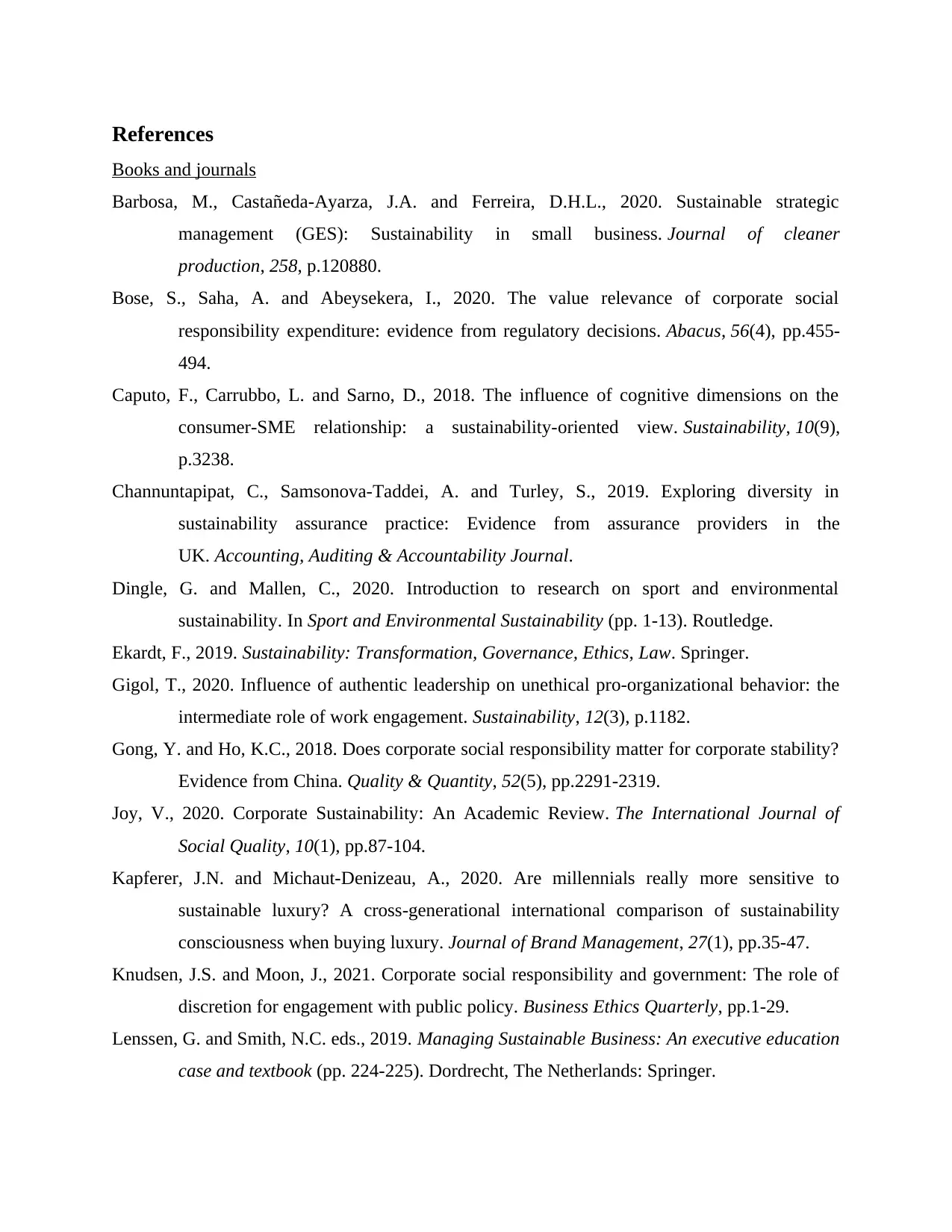
References
Books and journals
Barbosa, M., Castañeda-Ayarza, J.A. and Ferreira, D.H.L., 2020. Sustainable strategic
management (GES): Sustainability in small business. Journal of cleaner
production, 258, p.120880.
Bose, S., Saha, A. and Abeysekera, I., 2020. The value relevance of corporate social
responsibility expenditure: evidence from regulatory decisions. Abacus, 56(4), pp.455-
494.
Caputo, F., Carrubbo, L. and Sarno, D., 2018. The influence of cognitive dimensions on the
consumer-SME relationship: a sustainability-oriented view. Sustainability, 10(9),
p.3238.
Channuntapipat, C., Samsonova-Taddei, A. and Turley, S., 2019. Exploring diversity in
sustainability assurance practice: Evidence from assurance providers in the
UK. Accounting, Auditing & Accountability Journal.
Dingle, G. and Mallen, C., 2020. Introduction to research on sport and environmental
sustainability. In Sport and Environmental Sustainability (pp. 1-13). Routledge.
Ekardt, F., 2019. Sustainability: Transformation, Governance, Ethics, Law. Springer.
Gigol, T., 2020. Influence of authentic leadership on unethical pro-organizational behavior: the
intermediate role of work engagement. Sustainability, 12(3), p.1182.
Gong, Y. and Ho, K.C., 2018. Does corporate social responsibility matter for corporate stability?
Evidence from China. Quality & Quantity, 52(5), pp.2291-2319.
Joy, V., 2020. Corporate Sustainability: An Academic Review. The International Journal of
Social Quality, 10(1), pp.87-104.
Kapferer, J.N. and Michaut-Denizeau, A., 2020. Are millennials really more sensitive to
sustainable luxury? A cross-generational international comparison of sustainability
consciousness when buying luxury. Journal of Brand Management, 27(1), pp.35-47.
Knudsen, J.S. and Moon, J., 2021. Corporate social responsibility and government: The role of
discretion for engagement with public policy. Business Ethics Quarterly, pp.1-29.
Lenssen, G. and Smith, N.C. eds., 2019. Managing Sustainable Business: An executive education
case and textbook (pp. 224-225). Dordrecht, The Netherlands: Springer.
Books and journals
Barbosa, M., Castañeda-Ayarza, J.A. and Ferreira, D.H.L., 2020. Sustainable strategic
management (GES): Sustainability in small business. Journal of cleaner
production, 258, p.120880.
Bose, S., Saha, A. and Abeysekera, I., 2020. The value relevance of corporate social
responsibility expenditure: evidence from regulatory decisions. Abacus, 56(4), pp.455-
494.
Caputo, F., Carrubbo, L. and Sarno, D., 2018. The influence of cognitive dimensions on the
consumer-SME relationship: a sustainability-oriented view. Sustainability, 10(9),
p.3238.
Channuntapipat, C., Samsonova-Taddei, A. and Turley, S., 2019. Exploring diversity in
sustainability assurance practice: Evidence from assurance providers in the
UK. Accounting, Auditing & Accountability Journal.
Dingle, G. and Mallen, C., 2020. Introduction to research on sport and environmental
sustainability. In Sport and Environmental Sustainability (pp. 1-13). Routledge.
Ekardt, F., 2019. Sustainability: Transformation, Governance, Ethics, Law. Springer.
Gigol, T., 2020. Influence of authentic leadership on unethical pro-organizational behavior: the
intermediate role of work engagement. Sustainability, 12(3), p.1182.
Gong, Y. and Ho, K.C., 2018. Does corporate social responsibility matter for corporate stability?
Evidence from China. Quality & Quantity, 52(5), pp.2291-2319.
Joy, V., 2020. Corporate Sustainability: An Academic Review. The International Journal of
Social Quality, 10(1), pp.87-104.
Kapferer, J.N. and Michaut-Denizeau, A., 2020. Are millennials really more sensitive to
sustainable luxury? A cross-generational international comparison of sustainability
consciousness when buying luxury. Journal of Brand Management, 27(1), pp.35-47.
Knudsen, J.S. and Moon, J., 2021. Corporate social responsibility and government: The role of
discretion for engagement with public policy. Business Ethics Quarterly, pp.1-29.
Lenssen, G. and Smith, N.C. eds., 2019. Managing Sustainable Business: An executive education
case and textbook (pp. 224-225). Dordrecht, The Netherlands: Springer.
Secure Best Marks with AI Grader
Need help grading? Try our AI Grader for instant feedback on your assignments.
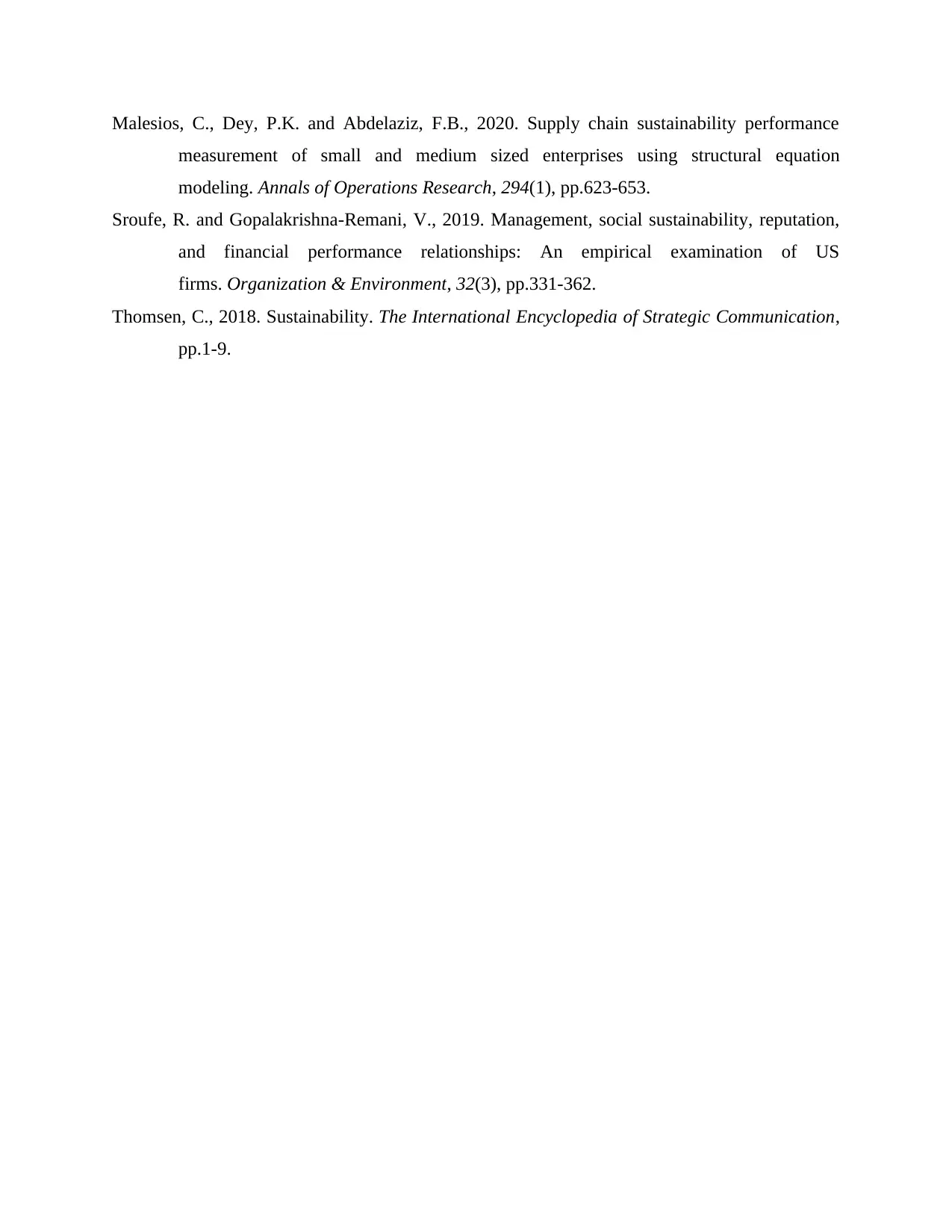
Malesios, C., Dey, P.K. and Abdelaziz, F.B., 2020. Supply chain sustainability performance
measurement of small and medium sized enterprises using structural equation
modeling. Annals of Operations Research, 294(1), pp.623-653.
Sroufe, R. and Gopalakrishna-Remani, V., 2019. Management, social sustainability, reputation,
and financial performance relationships: An empirical examination of US
firms. Organization & Environment, 32(3), pp.331-362.
Thomsen, C., 2018. Sustainability. The International Encyclopedia of Strategic Communication,
pp.1-9.
measurement of small and medium sized enterprises using structural equation
modeling. Annals of Operations Research, 294(1), pp.623-653.
Sroufe, R. and Gopalakrishna-Remani, V., 2019. Management, social sustainability, reputation,
and financial performance relationships: An empirical examination of US
firms. Organization & Environment, 32(3), pp.331-362.
Thomsen, C., 2018. Sustainability. The International Encyclopedia of Strategic Communication,
pp.1-9.
1 out of 11
Related Documents
Your All-in-One AI-Powered Toolkit for Academic Success.
+13062052269
info@desklib.com
Available 24*7 on WhatsApp / Email
![[object Object]](/_next/static/media/star-bottom.7253800d.svg)
Unlock your academic potential
© 2024 | Zucol Services PVT LTD | All rights reserved.





